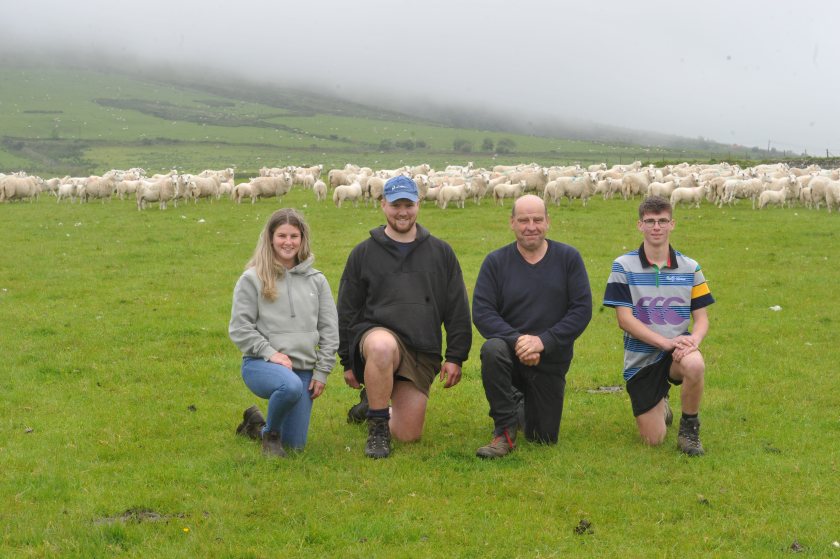
Lambs produced by an organic hill flock of Welsh ewes are hitting finishing weights two weeks earlier since performance recording was introduced to improve genetics.
The Parry family have been performance recording for four years, in the last year as part of the Welsh Sheep Genetics Programme (WSGP) and prior to that in the predecessor Hill Ram Scheme.
They run a flock of 500 Welsh ewes on an entirely grass-based system at Orsedd Fawr near Pwllheli, north-west Wales, recording 80 of these.
Gwyn and Delyth Parry, along with their children, Eifion and Elen, started performance recording for one simple reason. “We want to have a better flock," said Gwyn.
Historically they had relied on visual assessment to select replacements but could see major benefits in using estimated breeding values (EBVs).
Their focus has been on improving eight-week weights. “We were quite happy with ewe type and physical soundness-like teeth for example, but we knew we could improve on weights by concentrating on growth and fleshing ability," said Gwyn.
Welsh rams selected for the EBVs that would help them to achieve this were sourced from Prohill sales at Innovis.
Ewes are tupped in October with a ram to ewe ratio of 1:90, achieving a scanning average of 170% in the last breeding season.
All lambing is outdoors from the end of March with no concentrates or silage fed at any time of the year.
In the past four years, the overall flock average index has increased from £6.13 to £10.35, an increase of £4.22.
By selecting rams with EBVs in the top 25% for scan weight and eight-week weight, the Parrys are able to finish lambs earlier.
“We get lambs off the farm quicker, by an average of two weeks, and they have more condition," explained Gwyn.
“It is a win-win situation. It costs money to record but you always get your money back on those improvements."
Lambs are sold direct to slaughter from the end of June, at an average deadweight of 17kg and capturing the organic premium.
“If the grass is growing well, we will finish them for longer to achieve higher weights," Gwyn added.
The total value of lamb produced per ewe in the top 25% of the Orsedd flock averaged £100.86 in 2023 while for ewes considered below average for performance it was £88.43, a difference of £12.43.
Recording is one of the strategies the Parrys have been putting in place to make their 283-hectare business more sustainable.
Central to all these has been improving grassland management in their sheep and beef system, which has largely been achieved from rotational grazing.
“By measuring grass and getting the animals to graze the paddocks more efficiently, we are growing better quality grass and more of it," Gwyn reported.
Succession has been uppermost on Gwyn and Delyth’s minds as they have made the farm more resilient – as well as Eifion and Elen they have another two children, Robin and Guto, who are also carving out careers in agriculture.
The family is currently developing its succession plan, accessing the support available through Farming Connect to bring the next generation into the business.
“You’ve got to change with the time, although with our system of organic farming and not buying many inputs I feel like we are in a sense going back to how we first farmed, going full circle, but this time with the benefit of technology," said Gwyn.
He said he was grateful of the opportunity to be a part of the WSGP, and, combined with other changes, it had helped to get his business to a stronger place.
“We are not as dependent on the Single Farm Payment as we were six or seven years ago," he concluded.
“Grazing is the best investment for us, but genetics come a close second."
